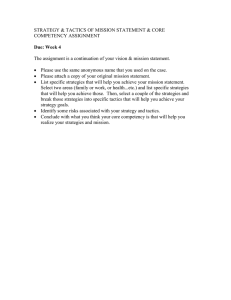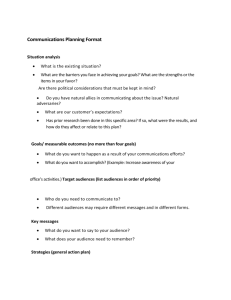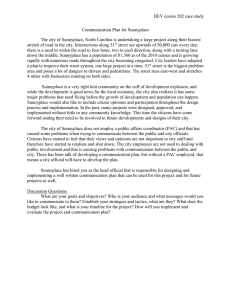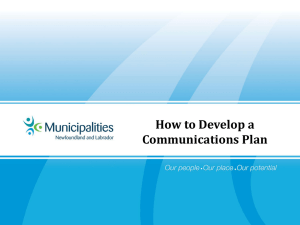DEVELOPING A COMMUNICATION PLAN (FOR PROJECT MANAGERS) HEV COURSE 202
advertisement
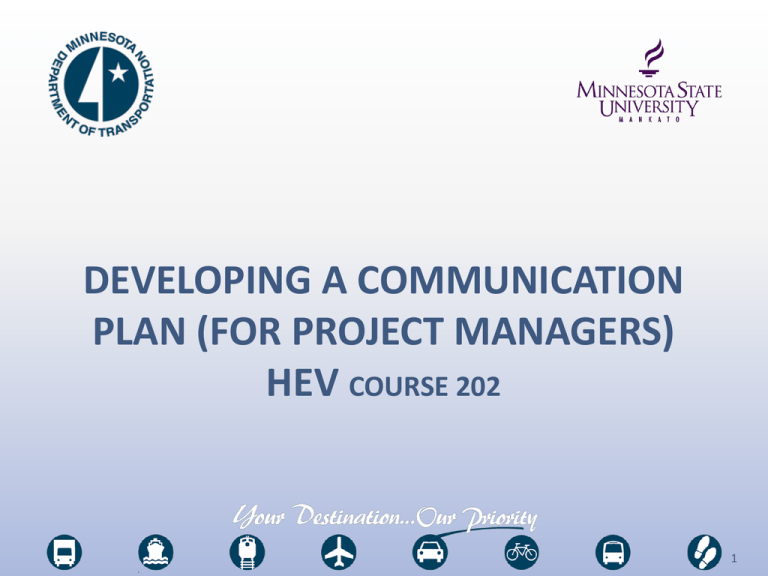
DEVELOPING A COMMUNICATION PLAN (FOR PROJECT MANAGERS) HEV COURSE 202 1 The Tools We Will Explore Today What is the Role of a Public Affairs Coordinator? Definition/Description What are the components to Communication Planning? Format Steps in a communication plan 2 Public Affairs Coordinator Public affairs coordinators facilitate mutual understanding between organizations and the public. This involves understanding the concerns of individual community members, interest groups, investors, consumers and government agencies, as well as addressing them through strategic use of the media and direct communication. These professionals may also plan and direct events designed to improve relations with the community, and coordinate public appearances for company executives. 3 Photo by Minnesota Department of Transportation 4 Communication Planning The success of the project is the responsibility of the project manager when a PAC is not involved. It is the project managers responsibility to develop a communication plan. The development of your own communication plan is essentially how the planner should respond to situations. Simple steps can be followed to craft a well organized communication plan. 5 Communication Planning The pieces of a communication plan are laid out in a logical order: The communication plan moves from Organizational Goals to Situation Analysis to Audience and Messages; The plan builds naturally from the most general to the most specific areas of concern. There are five steps in completing an effective communication plan and it’s important to try to fully complete each step before moving to the next one. • http://www.orgwise.ca/sites/osi.ocasi.org.stage/files/resources/Strategic%20Communications%20Planning%20%20COCo.pdf 6 STEPS IN A TYPICAL COMMUNICATION PLAN Goals & Situation Analysis Audience & Messages Strategies & Tactics Budget & Timelines Implement & Evaluate 7 Communication Planning Step One: Goals and Situational analysis Organizational Goals (Defining Success) (this should be the very first area you address) What are the barriers you face in achieving your goals? What are the strengths or the items in your favor? Communication Objectives (Defining Success) What is the existing situation? Situation Analysis: Organizational Background Has prior research been done in this specific area? If so, what were the results, and how do they affect or relate to this plan? Situation Analysis: External Environment What are our customer’s expectations? 8 Communication Planning Step Two: Audience and Messages Audiences (these must be determined before you move to messages) Who do you need to communicate to? Different audiences may require different messages and in different forms. Messages What do you want to say to your audience? What does your audience need to remember? 9 Communication Planning Step Three: Strategies and Tactics Strategies (must be determined before you move to tactics) What’s your general action plan? Tactics(requires a timeline of when tactics need to be executed and assignments to who will execute the tactics) What are the specific steps you will take to accomplish your goals? What communications tools and vehicles will you use to get your messages out to your different audiences? 10 Communication Planning Step Four: Budget and Timelines Budget (this is helpful to do before you develop the Timing and Timeline sections, in case you identify certain strategies/tactics requiring resources you don’t have access to) (for services that can’t be provided in‐house) What is your budget? How will you implement your plan based on your budget? Timing Create and follow a timeline for the project. Keep all people involved in the project up-to-date and informed of any changes to the timeline. 11 Communication Planning Step Five: Implement and Evaluate Implement the Plan What type of follow‐up is needed? Evaluate the Results How will you determine the success of your communications efforts? What qualitative and quantitative methods can be used to measure success rate? 12 Photo by Minnesota Department of Transportation 13 The Tools We Explored Today What is the Role of PAC? Definition/Description What are the components to Communication Planning? Format Steps in a communication plan 14 Sources and Resources MnDOT website www.dot.state.mn.us http://www.dot.state.mn.us/publicinvolvement/mndotemployees.html http://www.dot.state.mn.us/publicinvolvement/pdf/developingyourpub licinvolvementplan.pdf#communications Center for Community Organizations www.orgwise.ca http://www.orgwise.ca/sites/osi.ocasi.org.stage/files/resources/Strategi c%20Communications%20Planning%20-%20COCo.pdf Nathan Wegner for the Urban and Regional Studies Institute at Minnesota State University, Mankato http://www.sbs.mnsu.edu/ursi 15
